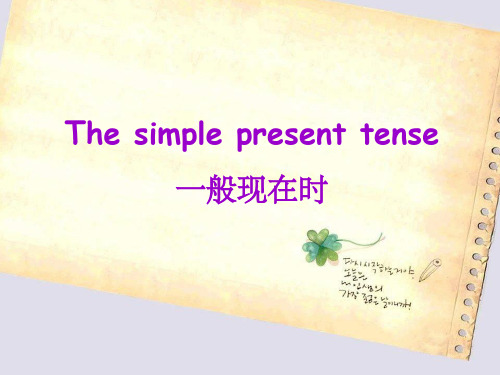英语一般现在时教学(课堂PPT)
合集下载
英语时态8种基本时态讲解.ppt课件

4)动词过去式变化规则。 a)一般情况下的词加-ed. work---worked call----called b)以不发音的字母e结尾的单词直接加-d . live----lived change----changed smoke----smoked die----died graduate----graduated drive----drove
8.过去完成时 表示动作发生在过去某一时间之前已经完成的动作或状态, 强调“过去的过去”, 常与 by the time, by the end of…,before , by 等引导时间的状语连用。
基本结构 主语+ had + 动词过去分词 + 其他成分 When I got to the cinema yesterday the film had begun already. He had learned English before he came here.
现在完成时与一般过去时的区别: 1)现在完成时侧重于对现在的影响;而一般过去时侧重于某一动作发生在过去某个时间或某段时间。即现在完成时侧重于现在的结果,而一般过去时侧重于动作发生的时间。例如:
I have seen the film. 我看过这部电影。(现在我仍记得电影的内容) I saw the film three days ago. 三天前我看了这部电影。(强调是三天前,而不是别的什么时候看的电影)
be going to含有“打算,准备”的意思,而will则没有这个意思, She is going to lend us her book. He will be here in half an hour.
be about to+V.原形(意为马上做某事,在时间上指最近的将来) I am about to leave school. 不能与表示时间的副词连用。 They are about to set out.(√) They are about to set,变y为i加-ed. study----studied carry----carried cry----cried try----tried d)以元音字母+y结尾的单词直接加-ed. play----played stay----stayed
8.过去完成时 表示动作发生在过去某一时间之前已经完成的动作或状态, 强调“过去的过去”, 常与 by the time, by the end of…,before , by 等引导时间的状语连用。
基本结构 主语+ had + 动词过去分词 + 其他成分 When I got to the cinema yesterday the film had begun already. He had learned English before he came here.
现在完成时与一般过去时的区别: 1)现在完成时侧重于对现在的影响;而一般过去时侧重于某一动作发生在过去某个时间或某段时间。即现在完成时侧重于现在的结果,而一般过去时侧重于动作发生的时间。例如:
I have seen the film. 我看过这部电影。(现在我仍记得电影的内容) I saw the film three days ago. 三天前我看了这部电影。(强调是三天前,而不是别的什么时候看的电影)
be going to含有“打算,准备”的意思,而will则没有这个意思, She is going to lend us her book. He will be here in half an hour.
be about to+V.原形(意为马上做某事,在时间上指最近的将来) I am about to leave school. 不能与表示时间的副词连用。 They are about to set out.(√) They are about to set,变y为i加-ed. study----studied carry----carried cry----cried try----tried d)以元音字母+y结尾的单词直接加-ed. play----played stay----stayed
一般现在时(课件)人教PEP版英语六年级下册

情况 一般动词 以x, sh, ch, s, tch结尾 以辅音字母加y结尾 以元音字母加y结尾 以o结尾 特殊情况
构成 加s 加es 去y,加ies 加s 加es
例词 comes, spells, waits, talks, sees, dances, trains
watches, washes, wishes, finishes study/studies, hurry/hurries, try/tries
③一般疑问句Do/Does+主语+实义动词原形+其他? Do you speak Chinese?
肯定回答 Yes,主语+do
Yes, we do.
否定回答 No,主语+don’t
No, we don’t.
④特殊疑问句 特殊疑问词+do/does+主语?
What does he do?
例句:①We have classes from Monday to Friday. 我们从周一到周五上课。 ②--- Do you often write to your friends? 你经常给你的朋友们写信吗?--- Yes, I do. /No, I don’t. 是的,我经常写。/不,我不经常写。
plays, says, stays, enjoys, buys does, goes
are/is, have/has
实战练习1--根据要求写句子。
1.Helen goes to school early. (改成否定句) ______________________________________________________ 2. That is a bus. (改成复数句子) ______________________________________________________ 3. I can read for a long time.(改成一般疑问句) ______________________________________________________ 4. Your mother is a doctor. (改成一般疑问句) ______________________________________________________ 5.My eraser is pink. (改成复数句子) ______________________________________________________
一般现在时ppt课件完整版

不可数名词作主语时,谓语动词用单数 形式。
可数名词单数作主语时,谓语动词也用 单数形式。
例如:Water is essential for life.(水 对生命至关重要。)/ A book is on the table.(一本书在桌子上。)
例外情况总结
当主语为并列主语时,谓语动词的数要与靠近它的主语保持一致。
练习3答案
reads。解析:主语 She 是第三人称单数 ,且时间状语为 on weekends,表示经 常性动作,所以谓语动词要用单数形式 reads。
THANKS
时间状语分类及举例
表示经常性或习惯性的动作
always, usually, often, sometimes
表示现在的状态或特征
now, at present, these days
表示普遍真理或客观事实
in general, as a rule
频率副词分类及举例
01
高频副词
always, constantly, continually
注意区分完全否定和部分否定。完全 否定表示全部否定,而部分否定表示 部分否定。例如,“None of the students passed the exam.”(没 有一个学生通过了考试)是完全否定 ;“Not all of the students passed the exam.”(并非所有学生都通过 了考试)是部分否定。
does he work?等。
动词短语和情态动词的变化规则
03
动词短语中的动词和情态动词后接动词原形,如I can swim,
they often go out等。
02 肯定句结构与用法
主语+动词原形+其他成分
初中英语一般现在时动词用法课件ppt(36张)

2 一般性的事实或者真理。
The sun rise in the east. 太阳从东方升起 The earth is round. 地球是圆的。
-What do you do?
-What do you do?
-I ...
- I ...
-What do I do?
-What do you do?
I go to school every day.
I do my homework every day.
I go to bed at 9:00.
二、实义动词
Know-point 2
1、实义动词的概念 实义动词,即行为动词,表示动作的动词。
I play basketball.
She wears a beautiful skirt.
三、动词的第三人称单数形式变化规则
1、一般由动词原形加-s walk-walks write-writes like-likes
写出下列词汇的第三人称单数形式:
talk say
______ ______
look __, sh结尾的动词加-es wash- washes watch-watches finish- finishes
—Do you eat every morning? —Yes, I do./No, I don't.
—Does she have a little brother? —Yes, she does./No, she doesn't.
翻译下列句子并作肯定否定回答
1 你们喜欢打篮球吗? 2 他在9点前睡觉吗? 3 Mary 是美国人吗?
It is a dog.
They are scientists.
初中英语八种时态讲解(课堂PPT)

主语为第三人称单数,则用doesn't,同时
还原行为动词。
一般疑问句:①把be动词放于句首;②用
助动词do提问,如主语为第三人称单数,
则用does,同时,还原行为动词。
4
什么情况下用?
5
①表示经常或习惯性的动作或存 在的状态。②表示主语通常的能 力、兴趣爱好、和性格特征。③ 表示客观的事实或真理。④表示 按照时刻表或已经计划安排好的 将来行为。(只限于是go, come, leave, arrive, begin, start, take off, stop, be等表示开始或移动意义的
在的某种状况。
时间状语:
always, usually, often, sometimes, every week
(day, year, month…), once a week, on Sundays,
etc.
基本结构:①be动词;②行为动词
否定形式:①am/is/are+not;②此时态的谓
语动词若为行为动词,则在其前加don't,如
21
过去进行时
22
1.概念:表示过去某段时间或某一时 刻正在发生或进行的行为或动作。
2.时间状语:at this time yesterday, at that time或以when引导的谓语动词是 一般过去时的时间状语等。
3.基本结构 主语+was/were +doing + 其他
4.否定形式:主语+was/were + not +doing+其他
27
时间状语:Tomorrow, next day(week, month, year…),soon, in a few minutes, by…,the day after tomorrow, etc.
人教版(PEP)小学英语五年级上册期末复习课件ppt---一般现在时(共42张PPT)

重点
有be用___b__e___,有情用 __情_____,无be无情请求 __助________ (___d__o___、 __d__o_e_s__) 。
时态句式
肯定句
否定句 疑问句
not “不”
一般疑问句 特殊疑问句
Yes,… No,…
特殊疑问词提问 What,Where…
Bonus time
放在be动词的__后_面___
notes
常见结构
I like sleeping very much. 1. 非第三人称单数主语+__V_原____
注意:常见的非第三人称单数主语有:
__I____,__w_e___,_y__o_u__,_t_h_e_y__, my friends,the farmers…
Make sentence
they usually
the students every day
常见结构
He makes a card after class. 2. 第三人称单数主语+_V__-_s_/_V_-__e_s (动词
_第__三__人___称__单__数______形式)
注意:常见的第三人称单数主语有:
无be无情请求助(do, does)
He reads books every day. 否定句:He __d_o_e_sn_’_t __r_e_a_d__ books every day. 一般疑问句: __D_o_e_s ___h_e_ _r_e_a_d__ books every day? 肯否回答: Yes, he does./ No, he doesn’t. 特殊疑问句: ____W__h_a_t ___d_oe_s___he _d_o___ every day?
人教版(PEP)英语六年级下册一般现在时课件

watch do wash
V三
works lives runs
规则
1.一样情形 -s
watches does washes
2. 以s,x,o,sh,ch 结尾 -es
动词变单三情势
1. 变形规则
2. 肯定句 3. 否定句 4. 一样疑问句 5. 特别疑问句
What’s the rule?
V原
study fly
here, but I am learning to ski. It's really interesting.
Please write to me soon.
Yours, Daniel
(1)Why does Daniel call it white Christmas?
It’s snowy on Christmas.
3.We have English class on Monday. _W__h_e_n_d_o__y_o_u__h_a_v_e_E_n__g_li_sh__c_la__ss_?_________
4.Li Tao usually runs in the park . _W__h_e_r_e_d_o_e_s_L__i _T_a_o_r_u_n__?________________
lunch
do homework
go to bed
get up breakfast go to school have…class lunch do homework go to bed
➢ I go to school on foot everyday.
get up
breakfast
go to school have class lunch
V三
works lives runs
规则
1.一样情形 -s
watches does washes
2. 以s,x,o,sh,ch 结尾 -es
动词变单三情势
1. 变形规则
2. 肯定句 3. 否定句 4. 一样疑问句 5. 特别疑问句
What’s the rule?
V原
study fly
here, but I am learning to ski. It's really interesting.
Please write to me soon.
Yours, Daniel
(1)Why does Daniel call it white Christmas?
It’s snowy on Christmas.
3.We have English class on Monday. _W__h_e_n_d_o__y_o_u__h_a_v_e_E_n__g_li_sh__c_la__ss_?_________
4.Li Tao usually runs in the park . _W__h_e_r_e_d_o_e_s_L__i _T_a_o_r_u_n__?________________
lunch
do homework
go to bed
get up breakfast go to school have…class lunch do homework go to bed
➢ I go to school on foot everyday.
get up
breakfast
go to school have class lunch
初中英语一般现在时学习课件(共25张ppt)

Watch TV
I often ( ) TV at 8:00.
my father and I go swimming every sunday
My father and I ( ) swimming every Sunday
we play football every Wednesday
We ( ) football every Wednesday.
•9、要学生做的事,教职员躬亲共做;要学生学的知识,教职员躬亲共学;要学生守的规则,教职员躬亲共守。2021/8/312021/8/31Tuesday, August 31, 2021 •10、阅读一切好书如同和过去最杰出的人谈话。2021/8/312021/8/312021/8/318/31/2021 7:50:25 AM •11、只有让学生不把全部时间都用在学习上,而留下许多自由支配的时间,他才能顺利地学习……(这)是教育过程的逻辑。2021/8/312021/8/312021/8/31Aug-2131-Aug-21 •12、要记住,你不仅是教课的教师,也是学生的教育者,生活的导师和道德的引路人。2021/8/312021/8/312021/8/31Tuesday, August 31, 2021
• You have to believe in yourself. That's the secret of success. 人必须相信自己,这是成功的秘诀。
•
Exercise
• 8.I ( ) a boy. • 9.You ( ) a girl. • 10.He ( ) a teacher.
Homework(家庭作业)
1.将所学内容重新看一遍。 2.当一回小老师,给爸爸妈妈讲解什 么是一般现在时。Fra bibliotek是辅音字母
人教版初中英语七年级上册第四单元《一般现在时》语法教学PPT课件

肯定变否定,be后加not
01 概念与用法
一般疑问句结构变化
Are you a good person? Is she/he a good person.
肯定句变一般疑问句,只需将 be动词提前
行为动词 的一般现在时是怎么构成的呢?
01 概念与用法
观察下列句子
1、I play football every day . 2、You play football every day . 3、My friends play football every day . 4、He plays football every day . 5、Tom plays football every day . 6、My brother plays football every day .
01 概念与用法
第三人称单数变化规则
一般动词后加-s。 like--likes He likes playing basketball.
以辅音字母+y结尾的单词, 变y为i,再加-es。 study--studies He studies English very hard.
以s、x、ch、sh结尾,后加es。 watch--watches My father watches TV every night.
Part. five
课后作业
改错题 1.Our English doesn’t likes music. 2. Tony goes always to school at eight o’clock. 3. Does your parents like watching TV? 4. Lily haves lunch at school. 5. My sister doesn’t her homework every .
01 概念与用法
一般疑问句结构变化
Are you a good person? Is she/he a good person.
肯定句变一般疑问句,只需将 be动词提前
行为动词 的一般现在时是怎么构成的呢?
01 概念与用法
观察下列句子
1、I play football every day . 2、You play football every day . 3、My friends play football every day . 4、He plays football every day . 5、Tom plays football every day . 6、My brother plays football every day .
01 概念与用法
第三人称单数变化规则
一般动词后加-s。 like--likes He likes playing basketball.
以辅音字母+y结尾的单词, 变y为i,再加-es。 study--studies He studies English very hard.
以s、x、ch、sh结尾,后加es。 watch--watches My father watches TV every night.
Part. five
课后作业
改错题 1.Our English doesn’t likes music. 2. Tony goes always to school at eight o’clock. 3. Does your parents like watching TV? 4. Lily haves lunch at school. 5. My sister doesn’t her homework every .
初中英语语法 一般现在时、过去时、将来时完整ppt课件

egtwoplusfourmoongoesaround经常性习惯性的动作经常性习惯性的动作目前的爱好能力目前的爱好能力客观事实客观事实动词三单形式规则变法
一般现在时、一般过去时 、将来时
精选课件PPT
1
Let's distinguish!
1. He does his homework every day. 2. I am a teacher. 3. We played the piano last Sunday. 4. They were at school just now.
going to 多用于自己打算、计划或有意做某事。
• 二、探究:
•1、动词come/go/leave/move/arrive/start等不和be going to连用,常用be
coming/going/leaving/moving/arriving/starting等来表示即将发生或安排好要做
的事。
---I ______ to the Great Wall.
A. go B. went
C. will go D. have gone
精选课件PPT
11
一一.一般般将将来来时时是(S表im示p从le现在fu开tu始re将t来en要s发e)生的事。
二.肯定句构成: 1. be going to do sth. 2. will / shall do sth.
Yes, they were.
No, they weren’t.
He could swim at the age of ten.
He couldn’t swim at the age of ten.
It took two hours to go there.
一般现在时、一般过去时 、将来时
精选课件PPT
1
Let's distinguish!
1. He does his homework every day. 2. I am a teacher. 3. We played the piano last Sunday. 4. They were at school just now.
going to 多用于自己打算、计划或有意做某事。
• 二、探究:
•1、动词come/go/leave/move/arrive/start等不和be going to连用,常用be
coming/going/leaving/moving/arriving/starting等来表示即将发生或安排好要做
的事。
---I ______ to the Great Wall.
A. go B. went
C. will go D. have gone
精选课件PPT
11
一一.一般般将将来来时时是(S表im示p从le现在fu开tu始re将t来en要s发e)生的事。
二.肯定句构成: 1. be going to do sth. 2. will / shall do sth.
Yes, they were.
No, they weren’t.
He could swim at the age of ten.
He couldn’t swim at the age of ten.
It took two hours to go there.
小学英语一般现在时-(演示)ppt课件

.
一般现在时
一般现在时 --表示经常或习惯性的动作 --表示现在的状态或主语具备的性格和能力等。
与频率副词usually ,often, sometimes ,always 和时间短语in the morning /afternoon/evening, at noon/night , every day /week /year /month 连用
如:plays, says 5、辅音字母+y结尾的单词,
去y,加ies, 如:worries, studies .
一般现在时
(否定句)
A:否定句在be动词和情态动词后加not。
例如 B:句中没有be动词或情态动词时,主语为第三人 称单数的否定句在动词前加does not (doesn’t), 非单三时,否定句在动词前加do not(don’t)
She is often late for school.
2. 表示表示客观事实
You are 13. He is a student.
You study at Olympic Garden Middle School.
3. 表示永恒不变的真理;
The moon goes round th. e earth.
.
B. 否定句:主语+don’t/ doesn’t+动词原形 +其他。 I study English every morning. I don’t study English every morning.
We speak Chinese. We don’t speak Chinese.
Jim likes playing football. Jim doesn’t like playing football.
- 1、下载文档前请自行甄别文档内容的完整性,平台不提供额外的编辑、内容补充、找答案等附加服务。
- 2、"仅部分预览"的文档,不可在线预览部分如存在完整性等问题,可反馈申请退款(可完整预览的文档不适用该条件!)。
- 3、如文档侵犯您的权益,请联系客服反馈,我们会尽快为您处理(人工客服工作时间:9:00-18:30)。
2. in the morning/afternoon/evening
3. every day/morning… 4. on Sundays(星期日)…
4
be 动词的一般现在时的句式: ☺肯定句:主语+be+表语(n., adj.等) e.g. He is a worker. You are thirteen. They are in the classroom. ☺否定句:主语+be+ not+表语 e.g. He is not a worker. You aren’t thirteen. They aren’t in the classroom. ☺一般疑问句:Be+主语+表语? e.g. Is he a worker? Yes, he is./No, he isn’t.
Yes, __I__ _d__o_. No, __I__ _d_o_n_’t
8
实义动词(第三人称单数)的一般现在时 句式
肯定句: ☺主语(He/She/It)+v-s/es+其他 e.g. He studies in a high school. Lucy has a pet.
否定句:☺主语(;其他
9
Fill the blanks
1、He _w_a_tc_h_e_s TV for 16 hours every day. 2、Lily _g_et_s_ up at six o’clock every morning. 3、She _d_o_es_n_’_t _h_a_v_e_ much money. (not have) 4、Tom _d_o_es_n_’_t __st_u_d_y_ in this school. (not study) 5、_D_o_e_s he _h_av_e_ a computer?
2
一般现在时(The Simple Present Tense)
1.表示现在的状态: e.g. He is twelve. She is at work.
2.表经常或习惯性的动作: e.g. I get up at 6:30 every day.
He often goes to the English corner. 3.表主语具备的性格和能力等:
Are they in the classroom? Yes, they are. No, they aren’t.
☺特殊疑问句:疑问词+be+主语? e.g. What is he? How old are you? Where are they ?
5
Fill the blanks 1、I __a_m__ a teacher. 2、She __is___ three years old. 3、She _is__ _n_ot_ a student. 4、They _a_r_e_ _n_o_t_ in the classroom. 5、_I_s__ he a policeman?
否定句;☺主语(I/We/You/They)+do+ not+v.+其他 e.g. We don’t study in a high school. They don’t have a pet.
一般疑问句;☺Do+主语(I/we/you/they)+v.+其他 e.g. Do you study in a high school?
Yes, __h_e_ __is__./ No, _h_e__ _is_n_’t_.
6
实义动词(第一人称、二人称、三人称复 数)的一般现在时句式
肯定句:☺主语(I/We/You/They)+v.+其他 e.g. We study in a high school. They have a pet.
Do they have a pet?
7
Fill the blanks.
1、We _st_u_d_y_ in the school. (study) 2、They _h_a_v_e a lot of money. (have) 3、I d_o_n_’_t_ _h_a_v_e_ much money. (not have) 4、They _d_o_n_’_t _s_tu_d__y in the school. (not study) 5、D__o__ you h_a_v_e_ any water?
The Simple Present Tense 一般现在时
二班第一小组:张安楠 王颖 苏晨 王天琪 潘小涛
1
用动词的适当形式填空 1. We often _p_la_y_ (play) on the playground. 2. He __g_e_t_s_ (get) up at six o’clock. 3. __D_o__ you _b_r_u_sh_ (brush) your teeth every morning? 5. Danny _s_t_u_d_i_e_s_(study) English, Chinese, Maths, Science and Art at school. 6. Mike sometimes _g_o_e_s_(go) to the park with his sister.
e.g. She likes noodles. They speak French.
4.普遍真理和自然规律:
e.g. Two plus four is six.
The moon goes around the earth.
3
指示一般现在时的时间短语
1.频度副词: sometimes(有时), often, always(总是),usually(通常),seldom,never(决不)
e.g. He doesn’t study in a high school Lucy doesn’t have a pet.
一般疑问句:☺Does+主语(he/she/it)+V.+其他? e.g. Does he study in a high school?
Does Lucy have a pet?
3. every day/morning… 4. on Sundays(星期日)…
4
be 动词的一般现在时的句式: ☺肯定句:主语+be+表语(n., adj.等) e.g. He is a worker. You are thirteen. They are in the classroom. ☺否定句:主语+be+ not+表语 e.g. He is not a worker. You aren’t thirteen. They aren’t in the classroom. ☺一般疑问句:Be+主语+表语? e.g. Is he a worker? Yes, he is./No, he isn’t.
Yes, __I__ _d__o_. No, __I__ _d_o_n_’t
8
实义动词(第三人称单数)的一般现在时 句式
肯定句: ☺主语(He/She/It)+v-s/es+其他 e.g. He studies in a high school. Lucy has a pet.
否定句:☺主语(;其他
9
Fill the blanks
1、He _w_a_tc_h_e_s TV for 16 hours every day. 2、Lily _g_et_s_ up at six o’clock every morning. 3、She _d_o_es_n_’_t _h_a_v_e_ much money. (not have) 4、Tom _d_o_es_n_’_t __st_u_d_y_ in this school. (not study) 5、_D_o_e_s he _h_av_e_ a computer?
2
一般现在时(The Simple Present Tense)
1.表示现在的状态: e.g. He is twelve. She is at work.
2.表经常或习惯性的动作: e.g. I get up at 6:30 every day.
He often goes to the English corner. 3.表主语具备的性格和能力等:
Are they in the classroom? Yes, they are. No, they aren’t.
☺特殊疑问句:疑问词+be+主语? e.g. What is he? How old are you? Where are they ?
5
Fill the blanks 1、I __a_m__ a teacher. 2、She __is___ three years old. 3、She _is__ _n_ot_ a student. 4、They _a_r_e_ _n_o_t_ in the classroom. 5、_I_s__ he a policeman?
否定句;☺主语(I/We/You/They)+do+ not+v.+其他 e.g. We don’t study in a high school. They don’t have a pet.
一般疑问句;☺Do+主语(I/we/you/they)+v.+其他 e.g. Do you study in a high school?
Yes, __h_e_ __is__./ No, _h_e__ _is_n_’t_.
6
实义动词(第一人称、二人称、三人称复 数)的一般现在时句式
肯定句:☺主语(I/We/You/They)+v.+其他 e.g. We study in a high school. They have a pet.
Do they have a pet?
7
Fill the blanks.
1、We _st_u_d_y_ in the school. (study) 2、They _h_a_v_e a lot of money. (have) 3、I d_o_n_’_t_ _h_a_v_e_ much money. (not have) 4、They _d_o_n_’_t _s_tu_d__y in the school. (not study) 5、D__o__ you h_a_v_e_ any water?
The Simple Present Tense 一般现在时
二班第一小组:张安楠 王颖 苏晨 王天琪 潘小涛
1
用动词的适当形式填空 1. We often _p_la_y_ (play) on the playground. 2. He __g_e_t_s_ (get) up at six o’clock. 3. __D_o__ you _b_r_u_sh_ (brush) your teeth every morning? 5. Danny _s_t_u_d_i_e_s_(study) English, Chinese, Maths, Science and Art at school. 6. Mike sometimes _g_o_e_s_(go) to the park with his sister.
e.g. She likes noodles. They speak French.
4.普遍真理和自然规律:
e.g. Two plus four is six.
The moon goes around the earth.
3
指示一般现在时的时间短语
1.频度副词: sometimes(有时), often, always(总是),usually(通常),seldom,never(决不)
e.g. He doesn’t study in a high school Lucy doesn’t have a pet.
一般疑问句:☺Does+主语(he/she/it)+V.+其他? e.g. Does he study in a high school?
Does Lucy have a pet?
